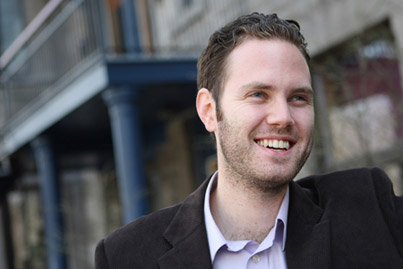Where to begin?

Alexander Herman, above, and co-authors Paul Matthews and Andrew Feindel turned their anxieties about life after school into a book about success.
Owen Egan
New book offers insight into the question on every graduate's mind
Third-year McGill law student Alexander Herman had just completed his undergraduate degree in English and history when he was struck by an uncomfortable question, one that has gnawed at many a recent grad: What now?
The Toronto native began chatting with longtime friends Paul Matthews and Andrew Feindel, who had studied filmmaking and finance, respectively, and they soon realized the dreaded doubt cut across academic disciplines: "We met up one night to talk about how confusing life was now that we didn't have school to guide us," Herman said, "and we had a lot of friends who were going through the same thing."
They began wondering just how common a feeling this twenty-something trepidation might be. Specifically, did the people we know are successful today ever have to go through this? And if so, what insights could they share with up-and-comers trying to figure out just which way up is?
Herman and his friends decided the best way to find out was simply to ask. About 500 letters and scores of interviews later, the three co-authored Kickstart: How Successful Canadians Got Started. Released in March, the result of their labour is a fascinating peek into how 60 Canadians – including Raffi, Angus Reid, Roberta Bondar, Brian Mulroney, Karen Cain, as well as former McGillians Raymond Moriyama and Matthew Coon Come – converted their uncertain twenties into success stories.
Although the diverse group makes for a varied set of stories, some common recommendations emerge, not the least of which are the ubiquitous (but often-forgotten) four words of advice: Do what you love. "The ones who did well in law, for example, did so because that was what they loved to do – they had wanted to do it since they were 13 and they just pursued it," Herman said. "No one really became successful doing something that they were kind of into but were good at."
Often, if that passion exists initially, stability will follow. "The money isn't necessarily there at first if you do what you love, but things will line up, things will work out," said Herman of their findings. (Celebrated designer Bruce Mau, for example, was "living like a student until five years ago, above a convenience store, eating off a hot plate.")
Herman also notes that many successful Canadians have had to engage in behaviour distinctly uncharacteristic of their stereotype. "They were kind of pushy, and that's something that we as Canadians are a little averse to," he said. "You know, we don't cut in line. Sometimes you need to really bug someone into helping you out – reading your script or investing in your business. You have to have a bit of nerve."
The book is a great read for those who find themselves in, or are curious about, that weird moment in life when anything seems possible, but nothing seems certain. Kickstart proves there is no single obvious method for becoming successful, but there is much to be learned from those who've made it after starting out with more questions than answers.
"There is no road map," Herman said. "We're not providing a road map, but showing guide posts along the way."

